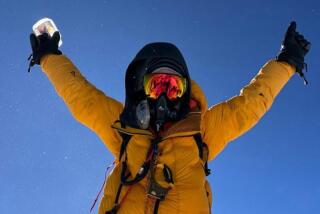Michael Ward, 80; Assisted in Everest Climb
- Share via
Michael Ward, who unearthed maps and aerial photographs that were crucial to the first successful ascent of Mt. Everest in 1953 and who accompanied Sir Edmund Hillary as the expedition’s doctor, has died. He was 80.
Ward, who was controversial among some mountaineers for giving science as much credit for the feat as the men who reached the top of the world, died Oct. 7 in Lurgashall, England.
Ward contended the conquest was a victory for science because doctors had figured out how to cope with the physiological effects of high altitude that had doomed earlier attempts to scale Mt. Everest, the 29,035-foot peak in the Himalayas on the border of Nepal and Tibet.
While scouring the Royal Geographical Society archives in London in 1951, Ward came across aerial photographs taken on clandestine flights over Mt. Everest. They “showed a perfectly good route up the mountain” from the Nepalese south side, Ward recalled in 2003.
He also uncovered a forgotten map of the mountain’s south side from the 1930s.
The discoveries were important because foreigners had little knowledge of the south side after being kept out of Nepal until 1949.
The expeditions in the 1920s and ‘30s had scaled the Tibetan side of Everest.
When Hillary and Tenzing Norgay, his Sherpa guide, descended from summit, Ward was waiting at the 22,000-foot-high camp to examine the mountaineer.
After the expedition, Ward said he had little time “for the adulatory cheer of audiences.” He became a surgeon and worked at hospitals in London’s East End.
In 1960, Ward participated in an experiment in the Himalayas that researched how altitude affected humans. For five months, he lived at 19,000 feet and climbed to 25,000 feet to pedal a stationary bike. Man would not survive long at those heights, he concluded.
Born in London, Ward’s interest in Everest was sparked as a boy when he read “Camp Six” (1937), Francis Smythe’s account of trying to reach the top of Everest in 1933.
Ward is survived by his wife and son.
More to Read
Sign up for Essential California
The most important California stories and recommendations in your inbox every morning.
You may occasionally receive promotional content from the Los Angeles Times.














